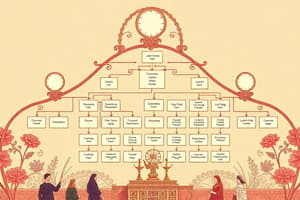Podcast
Questions and Answers
Which function of management involves setting objectives and determining a course of action?
Which function of management involves setting objectives and determining a course of action?
- Controlling
- Planning (correct)
- Organizing
- Leading
What best describes the role of middle-level management?
What best describes the role of middle-level management?
- Handles day-to-day operations and supervises employees.
- Focuses solely on short-term goals.
- Implements plans and policies set by top management. (correct)
- Determines overall direction and strategy for the organization.
Which leadership style emphasizes minimal direction and allows employees to make decisions?
Which leadership style emphasizes minimal direction and allows employees to make decisions?
- Laissez-Faire (correct)
- Transformational
- Autocratic
- Democratic
What type of management skills are specialized knowledge or expertise in a specific area?
What type of management skills are specialized knowledge or expertise in a specific area?
Which management theory emphasizes efficiency and productivity through scientific principles?
Which management theory emphasizes efficiency and productivity through scientific principles?
Which of the following is a challenge in management?
Which of the following is a challenge in management?
What is a characteristic of top-level management?
What is a characteristic of top-level management?
Which current trend in management focuses on environmental and social considerations?
Which current trend in management focuses on environmental and social considerations?
Flashcards are hidden until you start studying
Study Notes
Definition of Management
- The process of planning, organizing, leading, and controlling resources to achieve organizational goals.
Functions of Management
-
Planning
- Setting objectives and determining a course of action.
- Involves forecasting, setting goals, and formulating strategies.
-
Organizing
- Arranging resources and tasks to implement the plan.
- Establishing a structure for the organization (e.g., hierarchy, roles).
-
Leading
- Directing and motivating staff to achieve organizational objectives.
- Involves communication, leadership styles, and team dynamics.
-
Controlling
- Monitoring performance and making adjustments as needed.
- Includes setting performance standards and evaluating outcomes.
Management Levels
-
Top-Level Management
- Responsible for overall direction and strategy (e.g., CEOs, presidents).
- Focuses on long-term goals and policies.
-
Middle-Level Management
- Implements policies and plans from top management.
- Manages departmental functions and coordinates between top and lower levels.
-
Lower-Level Management
- Directly supervises employees and day-to-day operations.
- Focuses on short-term goals and operational tasks.
Management Skills
- Technical Skills: Specialized knowledge or expertise in a specific area.
- Human Skills: Ability to work with others, including communication and interpersonal skills.
- Conceptual Skills: Capability to understand complex ideas and make strategic decisions.
Leadership Styles
- Autocratic: Centralized decision-making with little input from employees.
- Democratic: Encourages participation and input from team members.
- Laissez-Faire: Provides minimal direction and allows employees to make decisions.
Key Management Theories
- Classical Management Theory: Focuses on efficiency and productivity through scientific principles.
- Behavioral Management Theory: Emphasizes human behavior, motivation, and group dynamics.
- Systems Theory: Views the organization as a system composed of interrelated parts.
- Contingency Theory: Suggests that management strategies depend on the context and environment.
Challenges in Management
- Adapting to change and innovation.
- Managing diverse teams and global operations.
- Balancing short-term and long-term objectives.
- Ensuring effective communication across all levels.
Current Trends in Management
- Emphasis on sustainability and corporate social responsibility.
- Increased use of technology and data analytics in decision-making.
- Focus on employee well-being and organizational culture.
- Agile management practices to enhance flexibility and responsiveness.
Definition of Management
- Involves planning, organizing, leading, and controlling resources to fulfill organizational goals.
Functions of Management
- Planning: Establishes objectives and a roadmap. Incorporates forecasting and strategy formulation.
- Organizing: Involves arranging resources and tasks within a defined structure, outlining roles and hierarchy.
- Leading: Focuses on directing and motivating employees through effective communication and understanding team dynamics.
- Controlling: Entails monitoring performance against standards, evaluating outcomes, and making necessary adjustments.
Management Levels
- Top-Level Management: Comprises CEOs and presidents who set long-term strategies and direction.
- Middle-Level Management: Tasks include executing top management's policies and coordinating functions among departments.
- Lower-Level Management: Directly oversees day-to-day operations and staff, focusing on immediate goals.
Management Skills
- Technical Skills: Expertise in specific areas relevant to the job or industry.
- Human Skills: Proficiency in interpersonal communication and relationships with team members.
- Conceptual Skills: Ability to grasp complex scenarios and make informed strategic decisions.
Leadership Styles
- Autocratic: Features centralized decision-making with minimal employee input.
- Democratic: Promotes team member participation and feedback in decision-making.
- Laissez-Faire: Offers limited direction, allowing employees to utilize their discretion in decisions.
Key Management Theories
- Classical Management Theory: Prioritizes efficiency and productivity based on scientific principles.
- Behavioral Management Theory: Centers on understanding human behavior, motivation, and the dynamics of groups.
- Systems Theory: Conceptualizes organizations as interconnected systems where parts influence one another.
- Contingency Theory: Proposes that management approaches should adapt based on contextual and environmental factors.
Challenges in Management
- Adapting to technological changes and fostering innovation.
- Managing a diverse workforce that spans across global operations.
- Balancing immediate needs with long-term strategic objectives.
- Ensuring effective communication across hierarchical levels.
Current Trends in Management
- A growing focus on sustainability practices and corporate social responsibility initiatives.
- Elevated integration of technology and data analytics for improved decision-making processes.
- Increased attention on employee well-being and enhancing organizational culture.
- Adoption of agile management practices to foster responsiveness and flexibility.
Studying That Suits You
Use AI to generate personalized quizzes and flashcards to suit your learning preferences.




